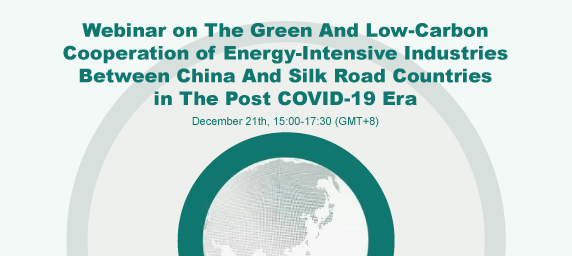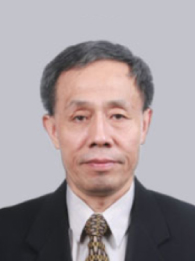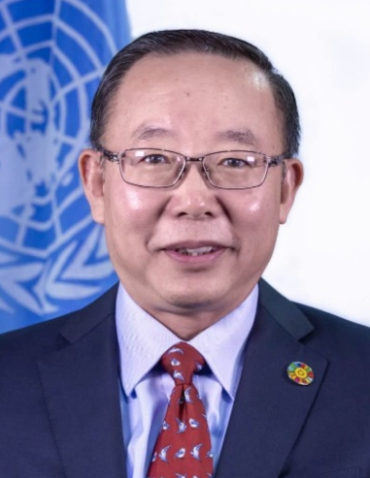
Host by:
Central Asia Regional Economic Cooperation Institute (CI)
International Finance Forum (IFF) Global Green Growth Center
Support by:
Belt and Road Green Development Partnership
Date: December 21th, 15:00-17:30 (GMT+8)
Time: 2.5 hour.
Location: Online Webinar (Zoom)
Sign up via QR code

Background
Central Asia boasts diverse population of 65 million people, and is one of the most vulnerable regions of climate change impacts and other social emergencies such as COVID-19 pandemic. Most economies of Central Asia have seen unprecedented growth over the past two decades, reaping benefits of market reforms and relatively high commodity prices in hydrocarbon and metals. However, many countries in this region have high dependence over fossil fuels and extractive industries, which are carbon intensive industries. Meanwhile, investment in technologies compatible with long-term decarbonization pathways remains marginal. The dependence on traditional carbon intensive industries might lock Central Asia countries on a high emission pathway, failing their mitigating commitments in the NDCs. Therefore, innovation approaches and systematic reforms in carbon intensive industries are required in Central Asia.
Central Asia Regional Economic Cooperation Institute (CI) has close partnership with the International Finance Forum (IFF) to conduct joint research on selected countries and facilitate a series of webinars for industry policy dialogues, to deepen the mutual understanding of both sides on pathways of low-carbon and green transition development. Based on the studies and dialogues, CI and IFF aim to, on the one hand, promote China’s green and quality industries to go-abroad, and on the other hand improve the governance in Central Asia in achieving the sustainable and green development.
China has been one of Central Asia’s major trading partners. The implementation of the Belt and Road Initiative (BRI) also increases the regional connectivity and cooperation between China and Central Asia. The green cooperation between China and Central Asia could contribute to regional green recovery, as well as climate risk mitigation and adaptation. China’s transition to quality growth, namely, in the low-carbon and clean transition in energy-intensive industries, could be useful lessons and experiences for Central Asia in improving efficiency and reducing carbon intensity. At the same time, there is a lack of understanding in China about the situation, challenges, and potential in the energy-intensive sector development in Central Asia. Therefore, more knowledge sharing and policy dialogues between China and Central Asia countries could inform policy makers and stakeholders in BRI to formulate more tailor-made solutions for the cooperation. In this context, Central Asia Regional Economic Cooperation Institute (CI), together with the International Finance Forum (IFF), supported by Belt and Road Green Development Partnership, organize an online webinar on “the green and low-carbon cooperation of energy-intensive industries between China and Silk Road countries in the post COVID-19 era” on December 18th. The 2.5-hour webinar will convene representatives from think tanks and energy-intensive sectors in China and Silk Road countries to exchange views on challenges and opportunities of green cooperation in the region. The webinar will be invitation only, and include English, Chinese and Russian with simultaneous interpretation provided.
Agenda
15:00 – 15:10 Welcome and Opening session
Moderator:

BAI Yunwen
Executive Director and researcher of Greenovation Hub, IFF GGGC Deputy Director
Opening Remarks:

LIANG Ziqian
Deputy Director of CI, Senior Advisor of IFF Global Green Growth Center (GGGC)

TANG Dingding
IFF Academic Committee Member, former Chair of the Compliance Review Panel of ADB, Senior Environmental Advisor for AIIB and BRICS New Development Bank, former Director General for the Department of International Cooperation in the Ministry of Environmental Protection of China
15:10 – 16:15 Session 1: The lessons and experiences of the quality growth of China’s energy-intensive industry
The session will discuss the pathway for energy-intensive industries to transition and low-carbon development and the lessons and experience for the energy-intensive sectors in Central Asia.
Moderator: Bai Yunwen
Presentation:
China’s national regulation and policies on green and low-carbon development and the pathway for energy-intensive sectors under the 2060 carbon neutral commitment

LI Junfeng
Senior Advisor of IFF Global Green Growth Center (GGGC), First Director General and Director of Academic Board, National Center for Climate Change Strategy and International Cooperation (NCSC), Chairman of Renewable Energy Committee, China Energy Research Society, Winner of Lifetime Achievement Award of the Zayed Future Energy Prize
Environmental Risk Management in China’s “Going Global” Production Capacity

CHEN Zhen
Distinguished Senior Legal Expert of IFF Global Green Growth Center, Managing Partner of Sunshine Law Firm, Specially Invited Guest Director of China Energy Research Society, Vice President of China Energy Law Research Society
Case study: the high-efficient and low-carbon pathway of regional energy-intensive industry development

LUO Tianhua
Senior Investment Consultant of Guangdong Electric Power Design Institute, China Energy Engineering group; Distinguished Senior Energy Expert of IFF Global Green Growth Center
Panel discussion (15min):
Leading questions:
Q1. How to lead China’s high-quality energy-intensive industries to “Going Global”?
Q2. How to identify and manage the environmental and climate risks when energy-intensive industries involve in global cooperation?
Q3. Based on Xi’s carbon neutral commitment, what challenges and opportunities could be expected from the cooperation between energy-intensive industries in China and in the Silk Road countries?
Q&A (With audience)
16:15 – 17:20 Session 2: The situation, challenges, and demands from Central Asia in the quality growth of the energy-intensive industry
The session will display the demands and opportunities for Central Asian countries to develop a clean, green and high-quality energy-intensive sector.
Moderator: Bai Yunwen
Presentation:
In the context of global decarbonization, the overview, state of play and outlook of Central Asia Regional Economic Cooperation (CAREC)

HU Xinglan
Supervisor, Principle Regional Cooperation Specialist of CAREC, Central and West Asia Department, ADB
Opportunities for a green, sustainable and resilient transition of energy-intensive sectors in Central Asia in the post COVID-19 era

LIU Hongpeng
Director, Energy Division, UNESCAP
Sergey Tulinov
Economic Affairs Officer, Energy Division, UNESCAP
The situation, challenges and demands for a clean, green and low-carbon transition for energy-intensive sectors in Central Asia

ZHAI Yongping
Chief of Energy Sector Group of the Asian Development Bank (ADB), Senior Advisor of IFF Global Green Growth Center (GGGC), Member of the Energy Technology Future Council of the World Economic Forum
Panel Discussion (15min):
Leading questions:
Q1. What regulation and policies exist in Central Asia to support the low-carbon development of energy-intensive sectors?
Q2. How could Central Asian countries attract private capital as well as foreign investments to improve the energy efficiency for domestic energy-intensive sectors?
Q3. What are the challenges and opportunities for Central Asian countries to implement green recovery in response to the COVID19?
Q4. Provide some cases for regional cooperation between China and Central Asia that contributes to the regional sustainable development.
Q&A (with audience)
17:20 – 17:30 Closing remarks
Moderator: TANG Dingding
About the organisers
Central Asia Regional Economic Cooperation Institute (CI)
The Central Asia Regional Economic Cooperation Institute (CI) is an intergovernmental organization dedicated to promoting the economic cooperation in the Central Asia and along the Silk Road through knowledge generation and sharing. The Institute is headquartered in Urumqi, Xinjiang Uygur Autonomous Region, the People’s Republic of China (PRC).
The CI is jointly shared, owned, and governed by eleven member countries: Afghanistan, Azerbaijan, the PRC, Georgia, Kazakhstan, Kyrgyzstan, Mongolia, Pakistan, Tajikistan, Turkmenistan, and Uzbekistan. It is a knowledge support arm of the CAREC region.
International Finance Forum (IFF) Global Green Growth Center
The Global Green Growth Center (GGGC), affiliating with the Green Growth Fund (GGF), is established under the umbrella of the International Finance Forum (IFF). It is an innovative research institute and supports IFF’s mission of “Comprehensive and sustainable development – New capital, new value, new world”. By leveraging IFF’s global resources and communication channels, GGGC aims to develop partnerships worldwide through dialogue and extensive collaboration with governments, businesses and civil society. Meanwhile, it endeavors to promote global sustainable development through GGF and other financial institutions and instruments. It also conducts research in and carries good practices of green growth and climate financing. GGGC is committed to serving the world through its strengths in the financial realm, in the form of providing innovative solutions to major pressing issues on global agenda, such as climate change, biodiversity conservation, the Belt and Road Initiative; and contributing to the implementation of sustainable development and the achievement of corresponding global goals. GGGC’s vision is to promote prosperity, development and climate security for China as well as the world by advancing sustainable finance and green growth. By promoting financial transformation and optimizing economic structures, it will fulfill the mission to enhance green growth and climate neutrality in the region and globally, support green development of the Belt and Road Initiative, and achieve green economic growth.



